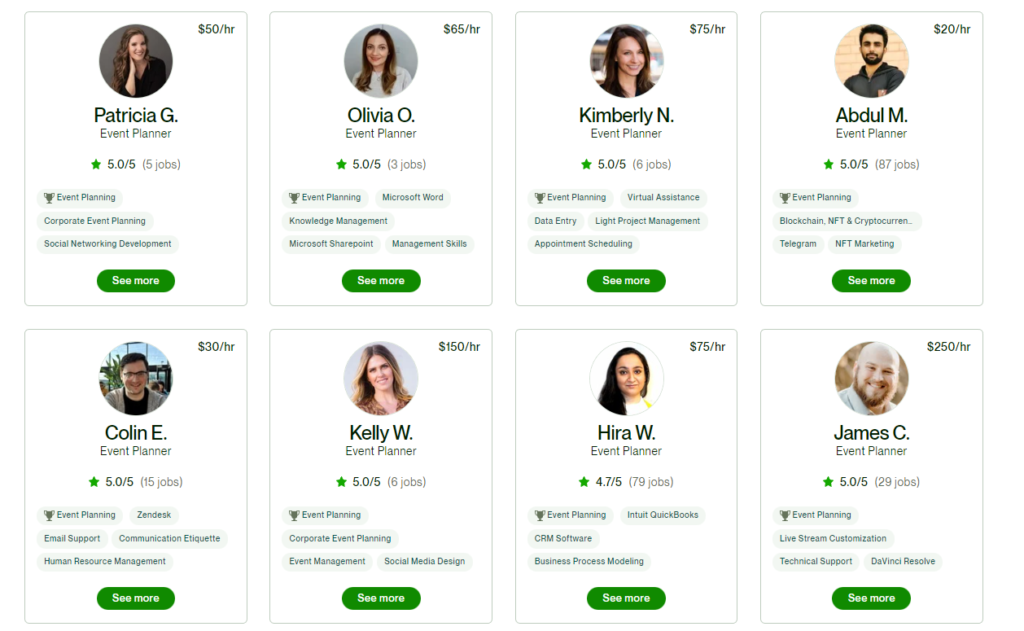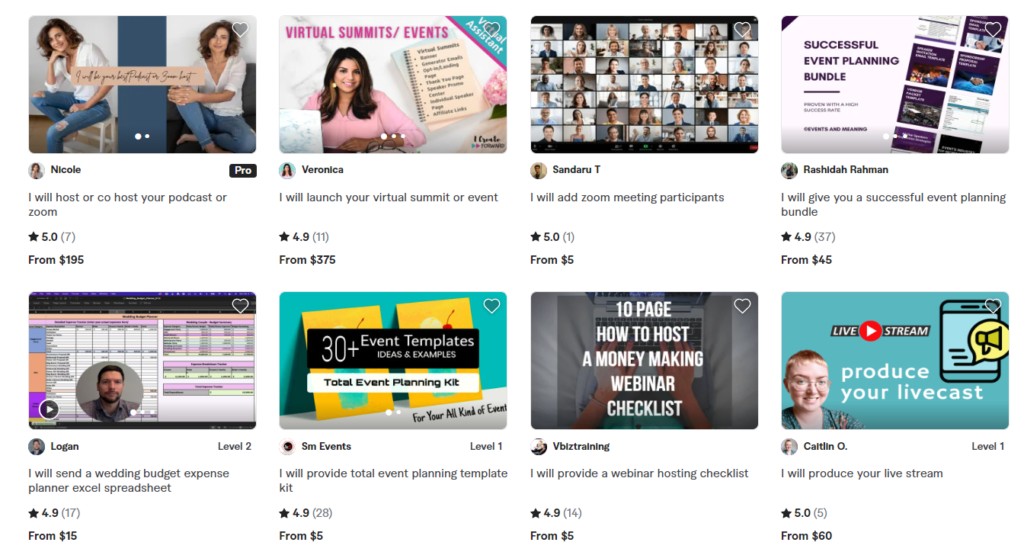Are you the life of the party? Do you have a knack for planning and organizing memorable events? If so, why not turn your passion for parties into a profitable side hustle? Event planning as a side hustle offers an exciting opportunity to showcase your creativity, attention to detail, and organizational skills while earning extra income.
Whether you’re a full-time professional looking to diversify your income streams or someone seeking a flexible and fulfilling part-time gig, this practical guide will walk you through the steps of setting up your event planning side hustle. From finding clients and managing logistics to delivering unforgettable experiences, get ready to embark on a journey that combines your love for celebrations with entrepreneurial success.
Get ready to make a splash in the event planning industry and create memorable moments for clients while reaping the rewards of your passion and talent.
How much money can you make?
Event planners can earn anywhere from a few hundred dollars to several thousand dollars per event.
For smaller-scale events like birthday parties or small weddings, event planners may charge a flat fee or an hourly rate ranging from $25 to $100 or more. For larger and more elaborate events such as corporate conferences or high-profile weddings, event planners often charge a percentage of the total event budget, typically ranging from 10% to 20%.
On upwork event planners charge from $30 to $250 per hour

On fiverr it ranges from $5 all the way up to $2000

What types of event does an event planner plan?
Event planners can plan a wide range of events across various industries and settings. Here are some common types of events that an event planner may handle:
Corporate Events
This category includes conferences, seminars, trade shows, product launches, corporate retreats, team-building events, award ceremonies, and company parties. Event planners coordinate logistics, manage budgets, and ensure that all elements align with the corporate brand and objectives.
Weddings
Wedding planners assist couples in bringing their dream weddings to life. They handle everything from venue selection, vendor management, budgeting, timeline creation, décor coordination, and overall event coordination to ensure a smooth and memorable wedding day.
Social Events
This category encompasses a variety of personal celebrations such as birthday parties, anniversary parties, baby showers, graduation parties, holiday parties, and other special occasions. Event planners help clients with theme development, venue selection, décor, catering, entertainment, and overall event coordination.
Nonprofit and Fundraising Events
Event planners work closely with nonprofit organizations to organize fundraising galas, charity auctions, benefit concerts, and other events aimed at raising funds and awareness for a cause. They focus on maximizing donations, coordinating volunteers, and creating impactful experiences for attendees.
Cultural and Entertainment Events
These events showcase cultural celebrations, festivals, concerts, art exhibitions, fashion shows, and theatrical performances. Event planners collaborate with artists, performers, venues, and sponsors to create immersive experiences that engage the audience.
Sporting Events
Event planners coordinate sports tournaments, races, competitions, and other athletic events. They manage logistics, participant registration, venue arrangements, and ensure a seamless event flow for both participants and spectators.
Educational Events
This category includes workshops, seminars, training sessions, and educational conferences. Event planners handle venue selection, speaker coordination, program scheduling, and logistical arrangements to create a conducive learning environment.
These are just a few examples, and the scope of events that an event planner can handle is vast and diverse. Event planners often specialize in specific types of events or industries based on their interests, expertise, and client preferences.

Is there any training you can take?
Yes, there are several training options available for aspiring event planners. Here are some common avenues for gaining the necessary knowledge and skills:
Event Planning Courses
Many educational institutions, colleges, and universities offer certificate programs, diplomas, or degrees in event planning or hospitality management. These courses cover various aspects of event planning, including event design, budgeting, marketing, logistics, and vendor management. They provide a comprehensive foundation and may offer opportunities for internships or hands-on experience.
Professional Event Planning Associations
Joining industry associations such as the International Live Events Association (ILEA), Meeting Professionals International (MPI), or the Professional Convention Management Association (PCMA) can provide access to educational resources, networking opportunities, and professional development events. These associations often offer certification programs or workshops specifically designed for event planners.
Online Courses and Webinars
Many online platforms and organizations offer event planning courses and webinars that can be completed at your own pace. These courses cover a wide range of topics and can be a convenient and cost-effective way to acquire knowledge and skills. Examples include courses on platforms like Coursera, Udemy, and Eventbrite.
Industry Conferences and Workshops
Attending industry conferences, workshops, and seminars is an excellent way to learn from experienced professionals, gain insights into the latest trends, and expand your network. These events often feature expert speakers, panel discussions, and educational sessions focused on event planning best practices.
On-the-Job Training and Internships
Seeking out opportunities to work with established event planning companies or professionals can provide valuable hands-on experience and mentorship. Volunteering or interning at events, even in a supporting role, can help you gain practical knowledge and industry exposure.
Remember, while formal training can provide a solid foundation, hands-on experience, continuous learning, and staying updated with industry trends are equally important for success as an event planner. Networking, building relationships with vendors and industry professionals, and staying abreast of the latest technologies and event management tools can also contribute to your professional growth.
Are there any certifications you can gain in event planning?
Certified Special Events Professional (CSEP): Offered by the International Live Events Association (ILEA), the CSEP certification is a globally recognized credential for event professionals. It validates your knowledge and experience in the special events industry, covering areas such as event design, logistics, budgeting, and risk management.
Certified Meeting Professional (CMP): The CMP certification, offered by the Events Industry Council (EIC), is designed for meeting and event planners. It demonstrates your competency in various aspects of event planning, including strategic planning, logistics, marketing, and financial management.
Certified Event Planner (CEP): The Certified Event Planner designation, offered by the Association of Certified Professional Wedding Consultants (ACPWC), focuses specifically on wedding planning. This certification program covers topics such as wedding design, vendor management, timeline creation, and client relations.
Certified Wedding Planner (CWP): The Certified Wedding Planner certification, offered by The Wedding Planners Institute of Canada (WPIC), is a comprehensive program that equips you with the knowledge and skills to plan and coordinate weddings. It covers everything from wedding etiquette and design to contracts and client management.
Digital Event Strategist (DES): The Digital Event Strategist certification, offered by PCMA (Professional Convention Management Association), focuses on the digital aspects of event planning. It validates your expertise in planning and executing virtual and hybrid events, leveraging technology, and engaging online audiences.
These certifications often require a combination of education, professional experience, and passing an exam. They demonstrate your commitment to professional development and can enhance your credibility as an event planner. However, it’s important to note that certifications are optional and not a requirement to work as an event planner. Practical experience, a strong portfolio, and a proven track record of successful events can be equally valuable in establishing yourself in the industry.

How to find clients
Finding event planning clients requires a combination of proactive marketing, networking, and building a strong reputation in the industry. Here are some effective strategies to help you attract clients:
Establish an Online Presence
Create a professional website that showcases your event planning services, portfolio, testimonials, and contact information. Optimize your website for search engines to increase visibility. Utilize social media platforms like Instagram, Facebook, and LinkedIn to share your work, engage with potential clients, and build your online brand.
Network within the Industry
Attend industry events, trade shows, and conferences to connect with other event professionals, vendors, and potential clients. Join professional associations, participate in online forums, and contribute to relevant discussions to expand your network. Word-of-mouth referrals from industry colleagues can be invaluable.
Offer Free Consultations or Initial Services
Provide complimentary consultations or small-scale event planning services to demonstrate your capabilities and build trust with potential clients. This can help you showcase your expertise and convince clients to hire you for larger events.
Collaborate with Other Professionals
Establish partnerships with complementary professionals such as venues, caterers, photographers, and florists. This can lead to referrals and collaborative marketing efforts that expand your reach and attract new clients.
Leverage Social Proof
Request testimonials from satisfied clients and feature them prominently on your website and social media platforms. Positive reviews and recommendations from previous clients can significantly boost your credibility and attract new business.
Target Local Businesses and Organizations
Reach out to local businesses, nonprofits, and organizations that frequently host events. Offer your services, highlight the benefits of hiring a professional event planner, and demonstrate how you can add value to their events.
Utilize Online Marketplaces
Register with online event planning marketplaces and platforms where clients often search for event planners. Examples include Thumbtack, Eventective, and GigSalad. Maintain a strong profile, showcase your expertise, and actively respond to inquiries to secure new clients.
Develop a Referral Program
Encourage satisfied clients to refer you to their friends, family, and colleagues. Offer incentives such as discounts or referral bonuses to motivate clients to spread the word about your services.
Remember, building a client base takes time and consistent effort. Focus on delivering exceptional service, exceeding client expectations, and nurturing relationships to foster repeat business and generate positive referrals.
Pro Equipment
Having the right equipment is essential for a successful event, and it’s equally important to have a skilled operator to handle it. Whether you choose to rent for the long term, opt for short-term hire, make a purchase, or confirm that the venue provides the necessary equipment, it’s your responsibility to ensure everything is in working order. Don’t leave it to chance – take the initiative and verify that all equipment is functioning as expected.
Here is a list the most often used kit
- Portable PA System:
Invest in a high-quality portable PA system that includes speakers, microphones, and a mixer. This will ensure clear and professional audio for announcements, speeches, and music. - Lighting Equipment:
Enhance the ambiance of your events with lighting equipment such as spotlights, uplighting, and string lights. This can create a visually captivating atmosphere and highlight key areas of the venue. - Projector and Screen:
A projector and screen are essential for displaying presentations, videos, and slideshows. Choose a projector with sufficient brightness and resolution to ensure clear visibility for all attendees. - Stage Platforms and Risers: Stage platforms and risers are useful for elevating performers, speakers, or VIPs, making them more visible to the audience. They also add a professional touch to the event setup.
- Decorative Elements:
Invest in a collection of decorative elements such as table linens, chair covers, centerpieces, and props. These can be used to create thematic settings and enhance the overall visual appeal of the event. - Event Signage:
Purchase a variety of event signage, including directional signs, banners, and table signs. Clear and well-designed signage helps attendees navigate the event space and ensures a smooth flow of traffic. - Registration and Ticketing Software:
Utilize registration and ticketing software to streamline the event registration process. This allows for online registration, ticket sales, attendee tracking, and check-in management. - Event Management Software:
Invest in event management software that helps you manage and organize various aspects of your events, including budgets, timelines, task assignments, and vendor management. - Photography and Videography Equipment:
Consider investing in professional-grade photography and videography equipment, including cameras, lenses, tripods, and lighting accessories. Capturing high-quality visuals of your events can serve as valuable marketing material for future clients. - Event Furniture and Accessories:
Have a collection of event furniture and accessories such as tables, chairs, podiums, and staging props. This allows you to create versatile and comfortable seating arrangements that match the theme and style of the event.
Remember, the equipment you choose should align with your target market and the types of events you plan. Prioritize quality and reliability when making purchasing decisions, as investing in the right equipment can enhance the overall experience for your clients and attendees.

Mastering Event Logistics: Essential Steps for Seamless Event Management
Managing the logistics of an event involves careful planning, coordination, and attention to detail. Here are some practical steps to help you prepare for and manage event logistics effectively:
Define the Event Objectives
Start by understanding the client’s goals and objectives for the event. Clarify the purpose, target audience, and desired outcomes. This will guide your planning and logistics decisions throughout the process.
Create a Detailed Timeline
Develop a comprehensive timeline that outlines all the tasks and milestones leading up to and during the event. Include deadlines for vendor bookings, contract signings, promotional activities, and other essential actions. A timeline helps you stay organized and ensures everything is completed in a timely manner.
Identify and Secure the Venue
Select a suitable venue that aligns with the event requirements and accommodates the expected number of attendees. Consider factors like location, capacity, amenities, and cost. Once finalized, secure the venue by signing the necessary contracts and paying the required deposits.
Manage Vendor Relationships
Identify and contract with vendors such as caterers, audiovisual providers, decorators, entertainers, and transportation services. Clearly communicate your expectations, negotiate contracts, and establish deadlines for deliverables. Maintain regular contact with vendors to address any questions or concerns leading up to the event.
Develop a Budget
Create a detailed budget that outlines all the anticipated expenses and revenue sources for the event. Consider factors like venue costs, vendor fees, marketing expenses, staff wages, and contingencies. Regularly track and update the budget throughout the planning process to ensure financial sustainability.
Coordinate Event Design and Décor
Collaborate with clients and/or event designers to develop a cohesive theme, color scheme, and overall aesthetic for the event. Arrange for appropriate decorations, lighting, signage, and props that align with the desired ambiance and branding.
Manage Attendee Registration
Set up an efficient registration system to capture attendee information, issue tickets or badges, and track attendance. Utilize online registration platforms or develop a customized system based on the event’s scale and requirements.
Plan for Audiovisual Needs
Determine the event’s audiovisual requirements, such as sound systems, projectors, screens, microphones, and lighting. Coordinate with the venue or external vendors to ensure the necessary equipment is available and properly set up.
Coordinate Event Logistics
Consider all logistical aspects, such as parking arrangements, transportation for VIPs or guests, security measures, and accessibility for individuals with disabilities. Create a detailed logistics plan that addresses these factors to ensure a smooth and seamless event experience.
Conduct Rehearsals and Run-throughs
Schedule rehearsals for key event components, such as presentations, performances, or ceremonies. Run through the event timeline with all involved parties to iron out any issues and ensure everyone understands their roles and responsibilities.
Develop a Contingency Plan
Prepare for unexpected situations by developing a contingency plan. Identify potential risks or challenges that could arise during the event and establish backup solutions or alternative arrangements.
On-site Event Management
During the event, oversee all logistical aspects, including vendor coordination, attendee management, setup and breakdown, and troubleshooting any issues that arise. Assign staff or volunteers specific responsibilities to manage different areas of the event.
Remember, effective event logistics management requires flexibility, adaptability, and the ability to think on your feet. Stay organized, maintain open communication with stakeholders, and be prepared to make adjustments as necessary to ensure a successful event.
Creating Unforgettable Experiences: 5 Tips to Delight Your Event Planning Clients
- Understand Your Client’s Vision:
Take the time to truly understand your client’s vision for the event. Engage in thorough discussions to gather their preferences, expectations, and desired outcomes. By aligning your efforts with their vision, you can deliver an event that exceeds their expectations and leaves a lasting impression. - Pay Attention to Details:
It’s the little things that can make a big difference. Pay meticulous attention to every detail of the event, from the venue setup and décor to the quality of food and beverages. Thoughtfully consider the ambiance, lighting, music, and overall atmosphere to create a cohesive and immersive experience that captivates attendees. - Personalize the Experience:
Tailor the event experience to your client’s unique needs and the preferences of their guests. Incorporate personal touches that reflect their brand, values, or individual personalities. Personalization can be achieved through customized signage, branded giveaways, interactive elements, or curated experiences that resonate with the audience. - Surprise and Delight:
Go the extra mile to surprise and delight your clients and their guests. Consider unexpected elements or special moments that can elevate the experience. This could be a surprise performance, a unique interactive activity, or a personalized gesture that creates a memorable and wow-worthy experience. - Seamless Execution:
A flawless execution is crucial to delivering an unforgettable event. Plan meticulously, communicate effectively with vendors and team members, and ensure that all elements come together seamlessly. Stay calm under pressure, troubleshoot any issues promptly, and maintain open lines of communication with your client throughout the event to address any last-minute changes or requests.
By focusing on understanding your client, paying attention to details, personalizing the experience, surprising and delighting attendees, and executing flawlessly, you can create an unforgettable event that leaves a lasting impression on your event planning clients.

Conclusion
In the world of event planning, delivering an unforgettable experience is the key to success. By understanding your clients’ vision, paying attention to details, personalizing the experience, surprising and delighting attendees, and executing flawlessly, you can create events that leave a lasting impression. Remember, it’s the combination of thoughtful planning, creativity, and exceptional execution that transforms ordinary events into extraordinary ones. So go ahead and strive to exceed expectations, leaving your clients and their guests with unforgettable memories that will be cherished for years to come.

